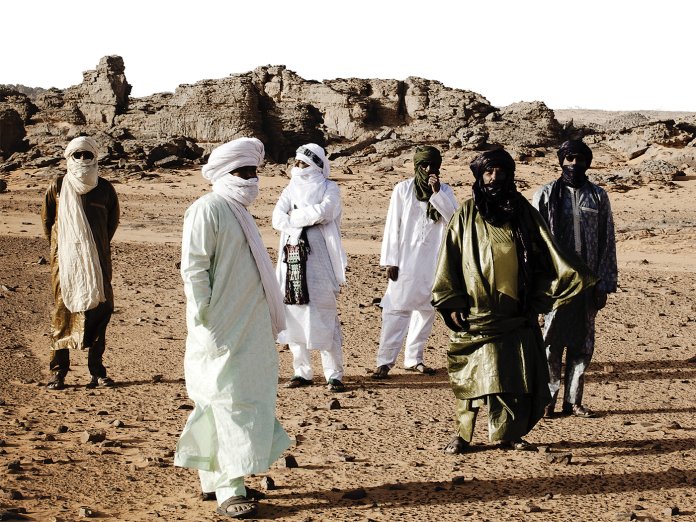We’ve come to expect protest music to be straightforward, a case of goodies against baddies. In geopolitical terms, protest music means the colonialised against the colonialists, the Global South against the Global North. But the long history of the Tuareg rock band Tinariwen is an object lesson in how messy and complicated rebellion can be. “Crazy things are happening/Incomprehension and confusion/Truth mixed with lies”, croons Abdallah Ag Alhousseyni on their latest album, over a wonderfully complicated 6/8 beat on “Iket Adjen” (Too Many Things).
Tinariwen see themselves as the voice of the Tuareg people who, spread out among several historically hostile countries, have been fighting multiple foes for decades, perhaps centuries. Their enemies include the governments of Mali, Niger, Libya, Algeria, Burkina Faso and Nigeria; the Kremlin-linked Russian mercenaries the Wagner group (hired by Mali’s military to do their dirty work); and the region’s many Salafist fundamentalists, like IS and Boko Haram, who would happily outlaw musicians like Tinariwen.
It means Tinariwen’s default setting is that of perpetual insurgency against pretty much everything. What are Tinariwen rebelling against? To quote Marlon Brando: whaddya got? It’s an outsider position that fits in with the spirit of rock’n’roll. We might not understand what they’re saying in Tamashek – nor might we necessarily support or even understand their cause – but there’s no mistaking the urgency and defiant swagger that pervades their music.
Amatssou translates as “beyond the fear” and this album reflects the increasingly parlous state of the Tuareg people across Saharan Africa. The opening track, “Kek Alghalm” (The World) is a live favourite they’ve performed for years, but one that here sets the mood of militancy. “Why so much silence, all over the world?” sings Abdallah Ag Alhousseyni over a galloping boogie riff. “Only spilt blood, only brave men killed”. The defiant mood continues with “Tenere Den” (The Desert), a piece of country rock that edges into Appalachian folk territory (including a fine fiddle solo from Fats Kaplin), where the desert is described as “white at times, and at other times red with the blood of the martyrs”.
You’d think the mood of militancy would lead to ferocious and uncompromising music. But this is a weirdly approachable album, one where Tinariwen’s desert blues fuses perfectly with American rock guests. They have a long history of collaborations, of course. It was the British producer Justin Adams who helmed their international breakthrough around 20 years ago, and they’ve since recorded with the likes of Warren Ellis, Mark Lanegan, Kurt Vile and Josh Klinghoffer. This album was initially meant to be recorded in the Nashville studio owned by Jack White – one of Tinariwen’s many big-name fans – but this was foiled by Covid and lockdown. Instead, the band set up a makeshift studio in a tent in an Algerian national park (a Unesco World Heritage Site) and were produced remotely by Daniel Lanois.
Where some of Tinariwen’s previous transatlantic collaborations haven’t quite worked, Lanois seems to have the balance right. The Canadian sits in, just as he’s sat in with the likes of U2, Dylan and Peter Gabriel over the years, playing guitars, pedal steel and piano. But his contributions are subtle, and Lanois, along with the other western guests, fits organically into Tinariwen’s desert blues.
The collaborations help even the most furious lyrics slip down nicely. “Arajghyne” (The Traitors) expresses anger about the growing spread of Islamic fundamentalism but, instead of some grimly militant marching song, we have Lanois’s pedal-steel guitar soaring over Alhabib’s fiddly, Johnny Marr-style guitar riffs. Likewise “Jayche Atarak” (Tareq’s Group) is a hymn to a unit who confronted French soldiers and ends with the line “the martyrs will be avenged”. Yet it’s a wonderfully limpid piece, one where Lanois’s pedal steel provides a sighing astral wail that complements the eulogy. Likewise, the opener “Kek Alghalm” sees Wes Corbett’s fiddly bluegrass banjo playing weaving perfectly with Alhousseyni’s grinding blues riffs.
The mood isn’t just fiery electric blues, though. “Ezlan” (Glory) is a soft, shuffling ballad that’s oddly reminiscent of Davey Graham or Pentangle, based around a fingerpicked acoustic guitar riff in 6/8, softened with Fats Kaplin’s sustained fiddle lines. The opening line, “Ezlan a imzad”, translates as “Glory to the violins”, but the instrument, the imzad, to which they’re referring is a one-string bowed fiddle that’s traditionally played only by women. As it happens, there are two imzad interludes here, played by Machar Fatimata. There’s also a female presence on the wonderful final track “Tinde”, where melismatic female voices float over a thunderous waltzing rhythm played on hand drums. It suggests that Tinariwen’s all-boys club is opening up, and all the better for it.



